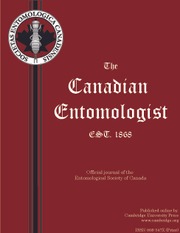Article contents
Impact of density and sex-dependent larval competition on selected life history traits of Drosophila melanogaster (Diptera: Drosophilidae)
Published online by Cambridge University Press: 21 November 2017
Abstract
An assessment of the effects of competitive behaviour and sex on seven selected life history traits of Drosophila melanogaster Meigen (Diptera: Drosophilidae) was made under precisely regulated larval density. Contrary to the conditions of crowding, as considered in many previous studies, the low scale of density enabled assessment of the life history traits at the individual level with higher precision and low variations. The 0-day-old first instars were reared with the relative density of 1,2, 3, and 4 individuals with optimal food until the adults emerged. The life history traits like age at pupation, age at eclosion, adult body weight, adult body length, wing length, and adult survival were used as response variables. Both the density and sex of the competitors were considered as predictors of the life history traits and a stronger effect was evident in the female sex than in males, which is statistically significant. Result also revealed the effect of competitive behaviour was more intense in case of same sex competitors than of opposite sex. In all instances, the life history traits exhibited a trend of decreasing function with the increasing larval rearing density, in compliance with the norms of density-dependent effects on development of Drosophila Fallén and similar insects.
- Type
- Behaviour & Ecology
- Information
- Copyright
- © Entomological Society of Canada 2017
Footnotes
Subject editor: Justin Schmidt
References
- 1
- Cited by


